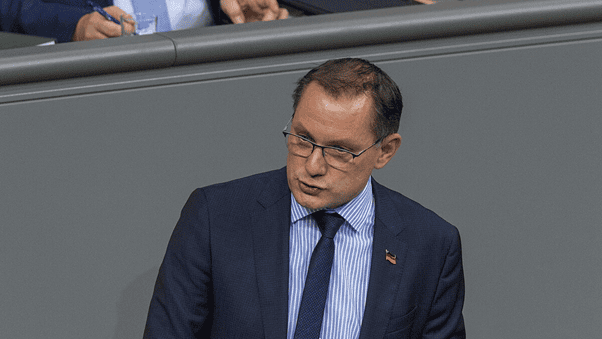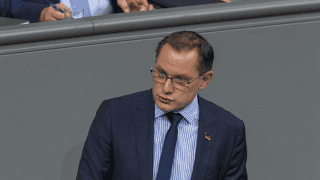
Photo. Photo. Olaf Kosinsky
”I do not currently see any danger to Germany from Russia,” said German politician Tino Chrupalla on ZDF’s talk show, while arguing that „Poland can also be a danger.” Chrupalla is the co-chair of the far-right populist Alternative for Germany (AfD), which currently leads German polls with about 26% support, ahead of the ruling CDU/CSU.
The German politician has long been known for his pro-Russian and anti-Western views, having visited Russia several times in the past and openly opposing German support for Ukraine. His party is increasingly accused by German centrist politicians of promoting the Kremlin’s interests inside the country, as they attempt to halt its electoral rise.
In a tense exchange with the presenter, Chrupalla also accused Poland of „double standards, the double morality” for refusing to extradite a Ukrainian citizen suspected by German authorities of sabotaging the Nord Stream gas pipelines in 2022. He added that „Poland’s economic interests are different from Germany’s, just like Russia’s.”
Despite fierce criticism, Chrupalla defended his remarks the very next day on ZDF’s morning programmeMorgenmagazin. He went even further, saying that his objective is „a policy of détente, which we urgently need”.
Chrupalla’s words were taken to an even greater extreme by Fabian Keubel, an AfD member active on platform X. In a recent post, he insinuated that Poland „not only committed the largest land theft in European history against Germany, but also the largest mass expulsion in human history,” reflecting the alarming revisionist sentiments among the party’s members.
The AfD, however, is becoming increasingly split over its stance toward Russia as the party attempts to soften its image and appeal to more centrist voters. For example, the defence policy spokesperson of the AfD parliamentary group, Rüdiger Lucassen, criticised his colleague, saying that Russia „shows no willingness to move towards peace” and that theory on the Polish threat is „absurd”.
Alice Weidel, who co-leads the AfD, also represents a markedly different position. She has criticised Russia for violating European airspace and condemned AfD members for travelling to Russia. Commenting on the latest remarks from Chrupalla, she said that the AfD „shouldn’t continue like this” and „can’t afford it.”
The escalating rift between Weidel and Chrupalla could prove decisive for the future of the AfD’s leadership and its stance toward Russia. Its outcome is especially important today, as the party has a real chance of entering government in future Bundestag elections and gaining a major influence on the shape of European-Russian relations.
Chrupalla’s case shows that some German politicians still envision a return to the old business model with Russia and perceive Poland’s opposition to such cooperation as a threat to German economic interests. Their views speak volumes about the enduring strength of Russian influence in Germany, even after nearly four years of war in Ukraine and amid an escalating hybrid conflict also directly affecting the country. This must inevitably raise questions about the transparency of these politicians« motives.
Such statements will not do any good for Polish-German relations, serving purely Russia’s divisive objectives. Chrupalla’s remarks quickly made headlines in Polish media, where they faced heavy criticism and fuelled anti-German sentiment. Moreover, they will certainly be exploited by Russian propaganda both internally and externally, fitting perfectly into its narrative of „a warmongering Poland and a peaceful Russia.”
